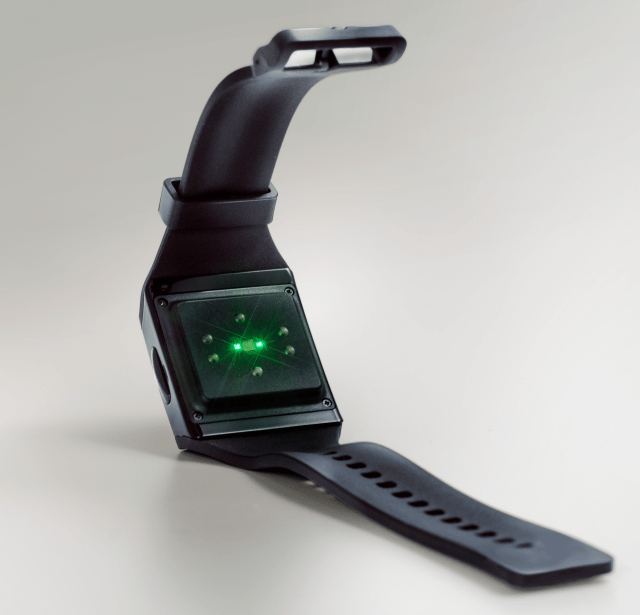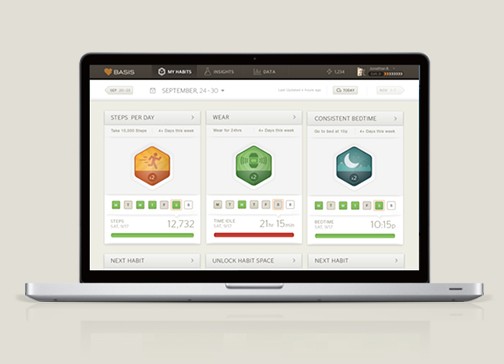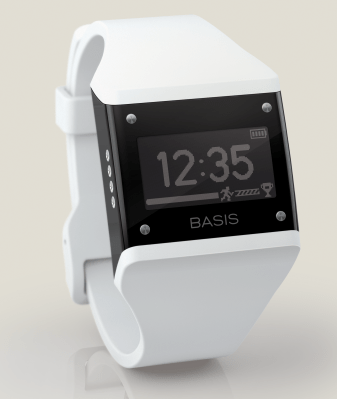Fitbits, FuelBands, and Jawbones don’t matter and neither does their data unless they make us healthier. That’s why Basis wants to build a platform that unites our fragmented quantified-self data and mines it for healthy ways to improve our behaviors. So today Basis announced an $11.75 million extension of its Series B and the hire of Ethan Fassett, former head of platform at gaming giant GREE.
The idea of a health data hub isn’t new. The promise is that instead of having one piece of software for each of our devices, all our data flows into a central repository where insights can be gleaned that no single piece of hardware could provide. But all attempts have failed. Even Google couldn’t make it work. But Basis CEO Jef Holove thinks he knows why: They didn’t start with hardware people loved and needed.
Hardware, Software, Platform In One
That’s where Basis’ own multi-sensor wristwatch comes in. While Fitbit, the Nike FuelBand, and the Jawbone UP just use accelerometers to track your steps and overall physical activity, Basis also tracks your heart rate, perspiration level, skin temperature and more. It’s bigger and costs more, but it does a lot more, too.
Until now, the Basis has been back-ordered. But the company has finally worked through its “high five-digits” waiting list and is starting to openly sell the Basis B1 watch to the public for $199.
 The watch hooks into Basis’ software that collects all your data. But beyond the typical charts and graphs whose novelty wears off because they don’t really tell you much, Basis crunches its multi-sensor data to provide more serious health insights. It can give you actionable suggestions for how to modify your behavior, and encourage you to keep exercising. This combats the No. 1 problem with fitness device, which is that people stop wearing them because they don’t feel like they’re getting any real value out of them.
The watch hooks into Basis’ software that collects all your data. But beyond the typical charts and graphs whose novelty wears off because they don’t really tell you much, Basis crunches its multi-sensor data to provide more serious health insights. It can give you actionable suggestions for how to modify your behavior, and encourage you to keep exercising. This combats the No. 1 problem with fitness device, which is that people stop wearing them because they don’t feel like they’re getting any real value out of them.
What could make those suggestions even better is data from other non-Basis devices and apps. So Basis plans to build a device-agnostic platform with Fassett’s experience and part of the $11.75 million it raised from Intel Capital (which will help it bolster its supply chain to crank out watches faster), iNovia Capital, Dolby Family Trust, Stanford University, and Peninsula-KCG, as well as previous investors Norwest Venture Partners, Mayfield Fund, and DCM. The funding expands the $11.5 million Series B that Basis raised in March, bringing it to a total of $32.3 million in venture capital.
 Holove explains that “The platform we’re building is intended to be open. There’s no reason we couldn‘t have complementary devices contribute data and make habits out of that data.”
Holove explains that “The platform we’re building is intended to be open. There’s no reason we couldn‘t have complementary devices contribute data and make habits out of that data.”
Becoming the central quantified-self hub brings all sorts of opportunities, both to make the human race healthier and to make a lot of money, so it’s no wonder Basis was able to raise again. With its platform pre-populated with data from its own watch, Basis may have the gravity to attract data from other devices. And there are plenty of other devices on the way.
Surviving The Smartwatches
Beyond helping the Basis watch distinguish itself from other health hardware, its extra sensors and software are critical to it surviving the coming onslaught of smartwatches from Pebble Samsung, LG, Sony…and likely Google and Apple. Most have or will have accelerometers and be able to serve as rudimentary fitness trackers. They could make Fitibit obsolete.
The question is whether smartwatches will give so many of us a compelling reason to buy them that the industry can support a half-dozen manufacturers or more. I’m skeptical. Most smartwatches seem to just make what we already do with our phones a tiny bit easier. Gee thanks, it now takes two hands to answer a phone call? One with the watch strapped to it, and one to press the buttons? That doesn’t sound worth my dollars yet.
Basis’ Holove agrees, telling me “If we’re going to ask consumers to wear technology, it must do something magical because you’re wearing it, that’s fundamentally impossible if you’re not wearing it. And I think smartwatches miss this.”
Basis couldn’t be in your pocket like a phone with an accelerometer. It has to be on your wrist to get the rest of its readings. And since Basis doesn’t just collect data but uses it to enhance your lifestyle, Holove says, “When they look at it, the value is very clear. People know why they’re buying us.”
